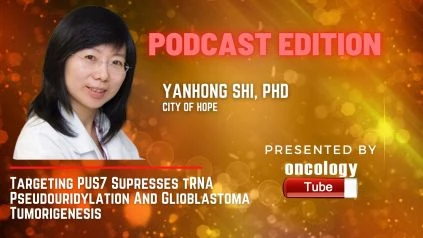Yanhong Shi, Ph.D., Professor, Department of Developmental and Stem Cell Biology at City of Hope speaks about Targeting PUS7 Suppresses tRNA Pseudouridylation And Glioblastoma Tumorigenesis.
Link to Article:
https://blog.cirm.ca.gov/2021/08/16/city-of-hope-researchers-discover-potential-therapy-to-treat-brain-tumors/
Link to Full Study:
https://www.nature.com/articles/s43018-021-00238-0
Glioblastoma (GBM) is an aggressive brain tumor that commonly affects adults. According to the American Association of Neurological Surgeons, this form of brain cancer has a dismal prognosis, with just 40% survival in the first year after diagnosis and 17% survival in the second year. Former US Senator John McCain and Beau Biden, the late son of US President Joe Biden, died as a result of this condition.
Dr. Yanhong Shi and her team at City of Hope, a cancer research and treatment facility, identified a possible therapeutic that has been demonstrated to inhibit GBM tumor development and increase the lifetime of tumor-bearing mice in a CIRM-supported lab that conducted the study.
Dr. Shi and her colleagues began by examining PUS7, a gene that is overexpressed in GBM cells compared to normal brain tissue. Dr. Qi Cui, a member of Dr. Shi’s team and the study’s lead author, reviewed multiple databases and discovered that high levels of PUS7 have also been linked to a poor prognosis in GBM patients. The researchers next looked at several types of glioma stem cells (GSCs), which are important for brain tumor growth, and discovered that turning off the PUS7 gene inhibited GSC proliferation and self-renewal.
The City of Hope researchers then implanted two types of GSCs into immunodeficient mice, one with the PUS7 gene switched on and the other without. They discovered that mice implanted with PUS7-lacking GSCs had less tumor development and lived longer than mice implanted with GSCs that carried the PUS7 gene.
The researchers next searched a database of thousands of chemicals and medicines licensed by the Food and Drug Administration for a PUS7 inhibitor (FDA). The researchers investigated the possible treatment in mice implanted with GSCs carrying the PUS7 gene after discovering a promising chemical. What they discovered was incredible. The treatment slowed the progression of brain tumors in mice, extending their lives substantially.

